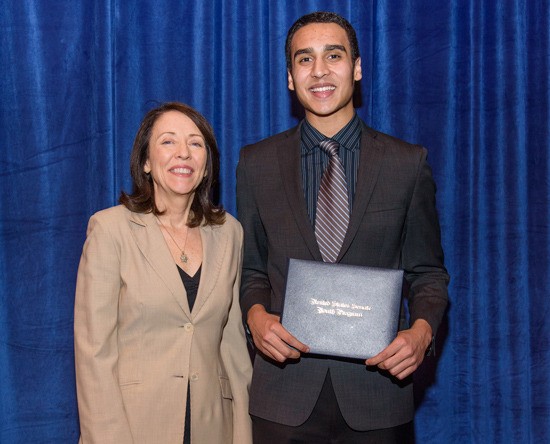It’s still many years before Sumner High School senior Hashwinder Singh could be elected to represent his state in Washington D.C., but his trip to the nation’s capitol last March has certainly taken him a step or two closer.
Singh was one of two Washington state students selected to participate in the United States Senate Youth Program and stay in D.C. for a week to learn the intricacies of the U.S. government, which included meeting dozens of key legislators, judges, reporters and President Barack Obama.
He was among 104 other students who equaled him in his passion for public policy and government.
“It hasn’t quite set in yet. It’s the coolest thing that I’ve ever been a part of,” Singh said. “It’s definitely the most I’ve grown in an entire week.”
The week started out with a visit to Mount Vernon and the News Museum (or the Newseum), but soon the group of 104 students (students from D.C. and Japan made up the extra four) toured the capital and talked to many people that shape the country, including Secretary of the Senate Julie Adams, Supreme Court Justice Ruth Bader Ginsburg, Archivist of the United States David Ferriero, senators Cory Gardner (R-CO) and Mazie Horono (D-HI) and many, many others.
“My highlight of the week was meeting President Barack Obama. That’s a once-in-a-lifetime opportunity,” Singh said. “The most resounding thing he said to me was, ‘we live in a time where there is so much hatred. There’s so much violence and anger. But really, if you look at the history of our world, if you want to be born at any time, right now is the time.'”
Although meeting the president was one of Singh’s favorite moments, meeting with Washington U.S. Sen. Maria Cantwell will end up being more important, because Cantwell has accepted Singh as one of the youngest interns in her office this summer.
“That was the most important opportunity I had, in terms of perpetuating myself and solidify myself as a politician,” said Singh.
Developing a voice for the voiceless
Sing’s passion for politics developed on top of a successful high school career as a full International Baccalaureate student, ASB President and varsity basketball player.
He said it was his parents who ultimately inspired him to become involved in public policy.
“There are so many people who don’t have the proper representation, I believe. I see that with my parents,” Singh said. “I will have that opportunity to be the voice for the voiceless, so to speak…. It’s something that my father told me about, that if I want to get into politics to be the voice of the voiceless. That really resonates with me, and having two immigrant parents who have worked hard every day of their lives, coming from India and seeing the things they had to go through, especially on the post 9/11 side.”
In order to be a voice for the voiceless, Singh said, he’s going to have to talk about what he thinks many of the nation’s leaders fear to mention – race, and race relations.
“There’s still racism in this country, whether we like to admit it or not. If the events of Charleston prove anything, it’s that there is a lot of underlying racial issues,” Singh said. “It’s an issue that’s very difficult to solve. It’s not going to get solved overnight, it’s not going to be solved in a year or two. Legislation doesn’t do a lot to solve issues – it alleviates some of the issues, but it’s not there to solve the issues.”
The first step toward alleviating the racial tension we feel, Singh explained, is to first admit that racism is still an issue in the country. And although events like Ferguson and Baltimore, and the Tamir Rice and Sandra Bland cases are getting more and more people to talk about race relations in this country, Singh said, it’s still not enough.
“I think its about time, 50-plus years removed from the civil rights movement, that we start making steps toward progress,” Singh said.
Everyone should vote
The 2016 presidential election will be the first national election Singh can participate in, and he believes everyone, especially students his age, should feel they have a stake in the outcome.
“Now more than ever, I think this is one of the most important election cycles that our generation needs to be involved in, and needs to get out and vote,” Singh said, noting that he’s seeing the younger generation getting involved in Bernie Sander’s campaign, like how Obama tried to get young voters involved when he ran in 2008. “I think that this election, a positive aspect of it, is getting a lot of people to vote.”
But Singh also sees how this tumultuous election is affecting the country negatively, especially concerning race relations and equality.
“There is a lot of partisanship, and blatantly speaking a lot of misogyny and racism that’s running through these campaigns,” Singh said. “We see that especially within the Trump campaign, to attack specific individuals and specific racial groups. That’s not something this country is built on. It was built on this idea of unity and collective spirit – together we stand, divided we fall – and when you start talking about individual groups and target specific individuals, whether it be for their physical disability or the color of their skin, that’s not what our country is built upon. It’s a poor reflection of the United States of America.”
“There are so many different components within this election that make people angry, or make people not want to vote,” he continued. “It just further inspires me why I want to get to where I want to go.”


